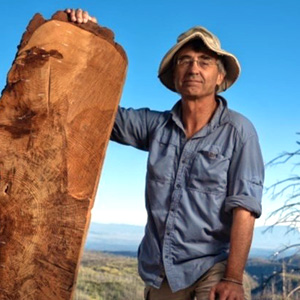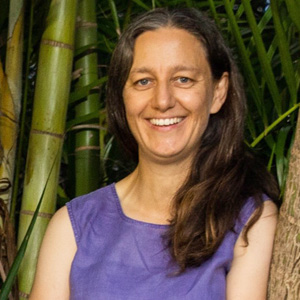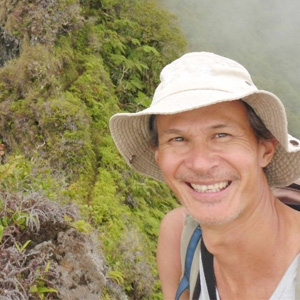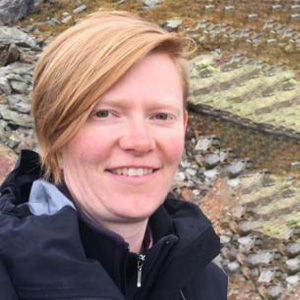Invited Plenary Speakers

Craig D. Allen
Read Biography
Presentation title: The global emergence of tipping point drivers of ecosystem disruption and vegetation reorganization
Bio: Craig D. Allen is a Research Scholar in the Department of Geography and Environmental Studies at the University of New Mexico. He recently retired from the U.S. Geological Survey as a research ecologist and founding leader of the New Mexico Landscapes Field Station, based in the Jemez Mountains of northern New Mexico, where he has conducted ecological research since 1981. Craig continues to do place-based, long-term research on the disturbance ecologies and environmental histories of Southwest US landscapes, and the responses of western US mountain ecosystems and forests globally to climate change, with many international collaborations. An elected Fellow of the Ecological Society of America (ESA) and of the American Association for the Advancement of Science (AAAS) “for outstanding leadership in the synthesis of global forest responses to climate change, built from worldwide collaboration and a deep understanding of the environmental history of the southwestern United States”; also received the US Department of Interior’s highest honorary recognition, the Distinguished Service Award: https://www.usgs.gov/centers/fort-collins-science-center/news/ecologist-recognized-department-interior-exceptional

Teagan Goolmeer
Read Biography
Presentation title: Indigenous Knowledge is saving our iconic species
Bio: Teagan is a proud Arabanna woman. She grew up in Newcastle (Awabakal country) and has worked in strategic policy reform, community engagement and biodiversity conservation across NSW, ACT and WA for the past 15 years. Teagan holds: a Bachelor of Applied Science; Bachelor of Education; and a Masters in Marine Science and Management.
Teagan believes the answer to the conservation issues facing Australia lies in the Indigenous-led use of Traditional Knowledge. She is currently undertaking a PhD with the University of Melbourne; Investigating systemic changes to empower Aboriginal and Torres Strait Islander Land and Sea Managers in biodiversity conservation.
Currently serving as Deputy Chair of the Federal Minister for the Environment’s Indigenous Advisory Committee (IAC), Teagan serves on several committees and boards, including Biodiversity Council, Wentworth Group of Concerned Scientists and North Australian Land and Sea Management Alliance.

Rachael Gallagher
Read Biography
Presentation title: (Re)making vegetation in the 22nd century: drivers of global vegetation composition in a rapidly changing biosphere
Bio: Dr Rachael Gallagher is Associate Professor in plant ecology and conservation science at the Hawkesbury Institute for the Environment, Western Sydney University. Rachael undertakes research that examines how plants may respond to our rapidly changing world, seeking solutions to better protect, recognise, and restore plant diversity globally. She is a member of the Australian government’s Threatened Species Scientific Committee, advising on extinction risk and recovery strategies for imperilled biota. Rachael gained her PhD from Macquarie University in 2012, and undertook postdoctoral research supported by the Australian Research Council Discovery Early Career Award. This Fellowship took her to the south-western deserts of the United States (via University of Arizona), Denmark (Aarhus University) and to the United Kingdom for collaborative research on plant traits, biogeography and liana ecology. In 2020, Rachael was awarded NSW Premiers Prize for Early Career Research (Biological Sciences) in recognition of her national assessment of the impacts of the 2019-2020 bushfire season on Australian plant diversity. Her work prioritising plant species for recovery actions after the fires has been widely applied to inform planning, management, and extinction risk assessment at the State and Commonwealth level.
Web link: https://www.westernsydney.edu.au/hie/people/researchers/associate_professor_rachael_gallagher

Jean-Yves Meyer
Read Biography
Presentation title: Threats and solutions to safeguard the vegetation of South Pacific islands
Bio: Dr. Jean-Yves Hiro MEYER (PhD at the Université de Montpellier, France, in 1994, Post-doctoral research scholar at the University of Hawaii, USA, in 1997, Scientific Director at the Conservatoire Botanique National de Mascarin, La Réunion Island, France, in 2001, Research Associate in Botany at the National Tropical Botanical Garden of Hawaii since 2008) is a research scientist working in French Polynesia and other Indo-Pacific Islands for the past 30 years. He was hired at the French Polynesian Department of Research in 2002, and was its Director between 2014-2020. A plant ecologist, field botanist and conservation biologist, and a recognized expert on invasive alien species in Pacific islands he is actively involved in research studies on the native and alien flora and fauna of French Polynesia where he organized multidisciplinary field-expeditions in the different archipelagoes (Austral, Marquesas, Society, Tuamotu). He also collaborates as an expert on numerous biodiversity projects across the Pacific (e.g. for the South Pacific Regional Environmental Programme, the Pacific Invasives Learning Network, Conservation International Micronesia-Polynesia Hotspot, IRD New-Caledonia, Cook Islands National Environment Service, Parque Nacional Rapa Nui, Service de l’Environnement of Wallis et Futuna). A guest Lecturer at the UC Berkeley Gump South Pacific Research Station on Moorea and at the Université de la Polynésie française where he coordinates a course on “Conservation biology and biological invasions on islands” for a Master of Science degree (“Environnement Insulaire Océanien”) for the past 10 years, he advises and mentors undergraduate, graduate, doctoral, and post-doctoral students working in French Polynesia, with projects in the areas of terrestrial plant and animal ecology and conservation biology, habitat restoration, and invasive species management.

Susanna Venn
Read Biography
Presentation title: Mountains as model environments to test plant responses to climate extremes
Bio: Dr Susanna Venn is an Associate Professor of Plant Ecology at Deakin University. Her research focusses on the processes that drive vegetation patterns and plant regeneration across alpine landscapes. She plays an executive role in managing the Australian Mountain Research Facility and uses this infrastructure in combination with manipulative experiments to investigate plant responses to drought, warming, fire and reductions in snow. Susanna chairs the Australian Institute of Alpine Studies, is a member of the Victorian Government’s Scientific Advisory Committee, the Global Mountain Biodiversity Assessment Scientific Steering Committee and the Afromontane Research Unit Advisory Board.
Twitter: @Susanna_Venn
https://www.deakin.edu.au/about-deakin/people/susanna-venn
Oliver Costello
Read Biography
Presentation title: Garima Webrrd Jagun (Respect Fire Country): Cultural burning and the role of Indigenous peoples in managing future Australia
Bio: Oliver Costello is a Bundjalung man from the Northern Rivers of NSW, with a diverse range of personal and professional expertise in culturally connected stewardship of Country. He is an Indigenous land and fire management consultant and works across the public, private, academic and not-for-profit sectors in various roles and appointments to support Aboriginal cultural land management. He is currently focused on First Nations knowledge and practice in caring for Country through regenerative cultural practices that support preparedness, recovery and resilience in relation to fire, floods and storms. Oliver was an Indigenous Contributing Author on the Extreme Events Chapter for 2021 State of Environment Report. He authored buubaan butherun (Flood Stories), which was commissioned by the NSW flood Inquiry (2022) and formed the basis for the key recommendation for Environment in the report. He has extensive experience working within the Indigenous land and sea management, conservation and cultural heritage management sectors and is particularly interested in empowering Aboriginal perspectives on fire, threatened and culturally significant species. Oliver is a Director on the National Koala Recovery Board and Co-Chair of the Koala Recovery Team First Nations Reference Group. Oliver set up the Firesticks initiative in 2009 and was a founding Director of the Firesticks Alliance Indigenous Corporation in 2018. He currently serves as a director of the Jagun Alliance Aboriginal Corporation and is the Vice President of the Northern Rivers Fire and Biodiversity Consortium. Oliver also sits on the board of Natural Hazards Research Australia, is a member of its Reconciliation Working Group, and is currently involved in the NHRA research project: ‘Cultural land management research and governance in south-east Australia’. He was lead author of the 2021 report, ‘Cultural Land Management in Southeast Australia: Developing the foundation for an Indigenous-led and codesigned research program for land management with Traditional Owners’, published by the Bushfire & Natural Hazards Cooperative Research Centre. NHRA also just published a fact sheet stemming from these projects, ‘Principles and protocols for cultural land management governance and research’, to guide more ethical and collaborative cultural land management research.
For an interview with Oliver Costello, see: https://onlinelibrary.wiley.com/doi/full/10.1111/emr.12530
Web page: www.jagunalliance.org.au
LinkedIn: www.linkedin.com/in/oliver-costello-49b6a213/
